#Arab Africa
Text
La Colonisation: French History of Death, Torture and Indescribable Violence in the Pearl of Its Evil Empire! Many Issues Arising From France’s Colonial Crimes in Algeria Have Still Not Been Resolved
— April 10, 2024 | RT
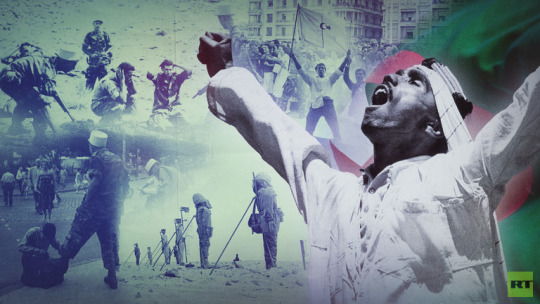
© RT/RT
Every year, Algeria remembers the colonial crimes committed by France against the Algerian people. The North African country commemorates several such dates throughout the year: February 13 – the day of the first nuclear test, July 5 – Independence Day, November 1 – Revolution Day, which marked the beginning of the eight-year independence war of 1954-1962, and December 11 – the day on which mass demonstrations started in 1960, and were brutally suppressed by French troops.
Algeria’s colonial period lasted for over 130 years, but the nation didn’t give up on its dream of breaking free from colonial oppression. Algeria’s sovereignty was finally recognized in 1962. But independence was won with a great deal of blood. According to official Algerian data, about 1.5 million local residents died in the war with France (1954-1962), about one sixth of the country’s population at the time.
Addressing the people on the occasion of Independence Day in 2021, Algerian President Abdelmadjid Tebboune recalled that the French colonialists were responsible for the most cruel violence, murder, and destruction in Algeria. Historians estimate that from 1830 to 1962 the colonialists caused the deaths of over five million people, including those who died as a result of contamination from nuclear tests.
In the 1954-1962 war against the National Liberation Front (Le Front de libération nationale, FLN), the French used civilians as hostages and human shields. Historians have documented numerous cases when French colonialists exterminated entire villages. They resorted to electric shock torture, used wells as prisons, threw prisoners from helicopters, and buried people alive in mass graves which the victims were forced to dig for themselves. The European invaders used the most sophisticated and cruel methods of torture.
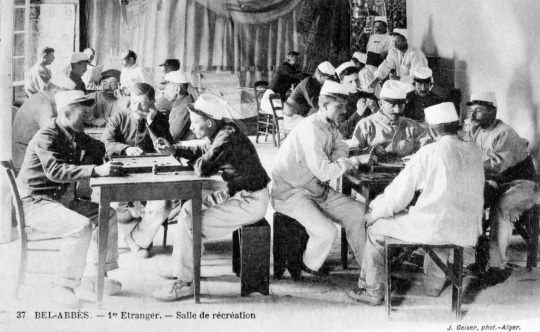
French Foreign Legion, Sidi Bel Abbes, Algeria, 20th century. French postcard. © Art Media/Print Collector/Getty Images
The Musée de l’Homme in Paris still houses 18,000 skulls acquired from dependent territories, of which only 500 have been identified, according to French media. Most of these skulls are not publicly exhibited. The skulls of several dozen Algerian resistance fighters have also been kept in the museum since the 19th century.
France’s colonial crimes affected not only people, but also Algeria’s cultural and historical heritage. During the occupation period from 1830 to 1962, the French transported hundreds of thousands of documents to Paris, including those related to the Ottoman period (1518-1830). Since gaining independence, Algeria has appealed to France to return the archive. But each time when this issue comes up, France says that according to its laws, the documents are considered classified and their disclosure is a threat to national security.
French Ontervention
The French invasion of Algeria in 1830 marked the beginning of the European country’s extensive colonization of Asian and African territories. The occupation process stretched on for several decades, as the local population put up an active resistance.
At the beginning of the 19th century, Algeria remained under the nominal rule of the Ottoman Empire, to which it regularly made tribute payments. However, the country retained much of its independence when it came to external political and commercial contacts. During France’s Italian and Egyptian campaigns (1793-1798) Algeria supplied Paris with wheat on credit. In the following decades, however, France refused to pay the debt, which resulted in major disagreements between the two countries.
In 1827, during one such dispute, Algeria’s Ottoman governor, Hussein Pasha, lost his temper and slapped the French ambassador Pierre Deval with a fly swatter (or a fan, according to other accounts). The King of France, Charles X, used this incident as an excuse to invade Algeria, believing that given the internal instability France was going through, an external military campaign could help rally society around the throne.
In the summer of 1830, a 37,000-strong expeditionary force from Paris arrived near Algiers and soon entered the city. Hussein Pasha capitulated. This victory did not help Charles X, who eventually abdicated, but the French remained in Algeria for the next 132 years.
Abd al-Qadir
Having occupied several Mediterranean ports, the Europeans decided to move inland, but at that point the local Arabs and Berbers, who had previously fought against the Ottoman Empire, put up strong resistance.
The anti-French movement was led by Abd al-Qadir, the son of the leader of the Qadiriyya, a local Sufi order. In November 1832, he was proclaimed as the emir of the Arab tribes in the west of the country, and united the local population in the fight against the French occupation. Abd al-Qadir was adept at managing territories and conducting guerrilla warfare, and fought against the invaders for 15 years. He became a legendary figure, and his fame spread throughout the Muslim world and Europe.
Abd al-Qadir was very popular among Algerians, since he was considered a descendant of the Prophet Muhammad (i.e. a Sharif) and a true ruler of the faithful. However, resorting to pogroms and the mass extermination of the local population, the French deprived him of the support of many military leaders and turned the course of the war in their favor.
The Algerians paid a heavy price for the resistance – hundreds of thousands died as a result of it. From 1847 to 1852, Abd al-Qadir remained in a French prison, after which he was released and went to live in exile in Damascus, where he died in 1883.
Algérie Française: No Rights For Locals
In the following decades, Algeria was actively colonized, and the colonial territory expanded south. By 1847, there were about 110,000 European settlers in Algeria, and by 1870 this number had doubled.
In 1848, Algeria was declared a territory of France and was designated as its overseas department, with a European Governor-General in charge. The locals became subjects (but not citizens) of France. After the Ottomans were ousted from Algeria and the Abd al-Qadir movement was suppressed, the French had to deal with several other major uprisings in the 19th century, the last of which occurred in 1871-1872.
By the beginning of the 20th century, the French had conquered lands stretching from the Mediterranean Sea to the Sahara. In the 1920s, over 800,000 French settlers resided in Algeria. Three provinces – Oran, Algiers, and Constantine – became French departments. They elected representatives to the French Chamber of Deputies, but only European settlers who backed the interests of Paris could take part in these elections. Algerians did not have the right to vote.
Economic Benefits
Economically speaking, the period between 1885-1930 is considered the golden age of French Algeria (and of the entire French Maghreb region). The country’s most important ports and cities were rebuilt and modernized and the agricultural sector was actively developed. Muslims had relative autonomy and retained their religious and cultural institutions.
The demographic boom, facilitated by European achievements in the fields of health and medicine, led to a threefold increase in the population, which reached nine million by the mid-20th century. Out of these, about a million were French colonists who seized about 40% of the cultivated land, which meant the most fertile land in the country belonged to them.
In other areas of life, there was also inequality between the locals and the colonizers. Local workers were paid less, and about 75% of Algerians remained illiterate. Despite these issues, however, peace lasted in the country for many decades.
Paris derived great economic benefits from its new territories. Algeria occupied a central place among France’s eastern possessions and its location was strategically important since the most convenient routes which connected France with its colonies in West and Central Africa passed through Algeria.
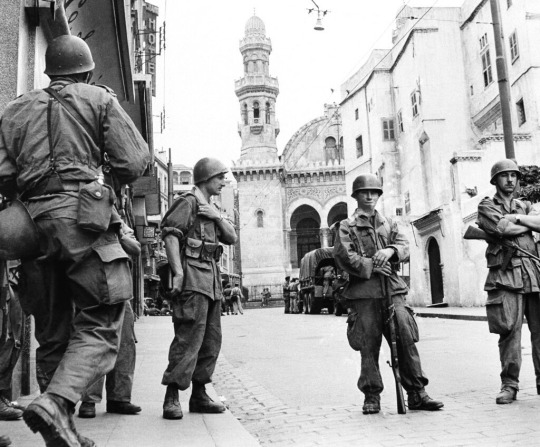
In May 27, 1956 file photo, French troops seal off Algiers' notorious casbah, 400-year-old teeming Arab quarter. © AP Photo, File
The largest and bloodiest massacre committed by France in a single day occurred on May 8, 1945, when hundreds of thousands of Algerians took to the streets to celebrate the end of World War II. When people started shouting slogans demanding independence, the colonial forces opened fire on the peaceful protesters. At least 45,000 unarmed demonstrators were killed that day.
Protests broke out in France as well, and were also brutally suppressed. October 17, 1961, went down in history as the day of the “Massacre on the Seine”, or the “Paris pogrom”. On that day, about 60,000 Algerians took to the streets of Paris, demanding an end to the colonization of their country. The French authorities again used firearms against peaceful protesters, many of whom were thrown into the River Seine. The death toll amounted to 1,500, while 800 people went missing, and thousands were detained.
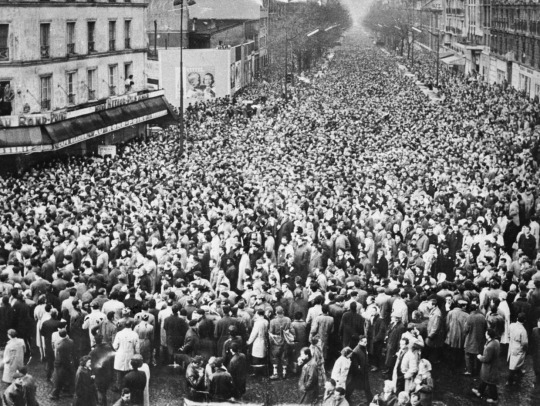
The working people of Paris demanding an end to the war in Algeria. 1962. Reproduction of a photo from the newspaper L'Humanite. © RIA Novosti / Sputnik
However, this did not stop the national liberation movement in Algeria. In November 1954, an alliance of several political organizations formed the National Liberation Front (le Front de Libération Nationale), which headed the armed struggle for independence. Many underground guerrilla groups also sprang up that supported the sovereignty of Algeria. At the end of 1954, they all went into attack, and this marked the beginning of the Algerian War of Independence, which lasted until March 1962.
Paris sent additional military units to Algeria to fight the rebels. An estimated 500,000 to 1.5 million local residents and over 15,000 European servicemen died as a result of the hostilities, which lasted more than seven years.
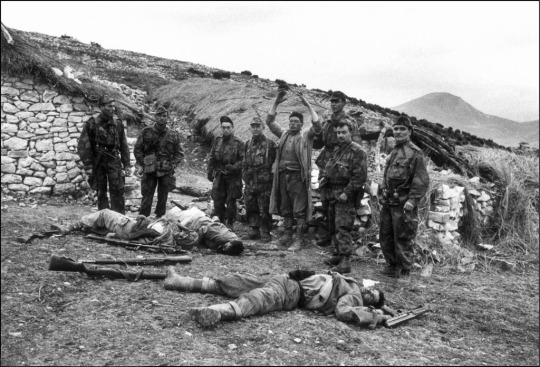
French soldiers looking at dead bodies during "Operation Bigeard" in March 1956, when an armed outbreak in Souk-Ahras, South of Constantine region, Algeria. © Reporters Associes/Gamma-Rapho via Getty Images
France won the war on a tactical level, but suffered a political and reputational defeat – its actions drew sharp criticism from its own citizens and the world community.
After negotiations and the signing of the Évian Accords, Algerians held a referendum and almost unanimously voted for independence, which was officially proclaimed on July 5, 1962.
Demining
After the war, it was necessary to clear the territory of mines. Since Algeria did not have qualified sappers, it requested assistance from European countries (Italy, Sweden, and Germany), but they refused to help. Private companies could not solve the problem either.
It was then that the USSR agreed to help Algeria, free of charge. On July 27, 1963, an agreement was signed between the Soviet leadership and Algeria. Soviet specialists removed about 1.5 million mines in Algeria from 1962 to 1965.
Nuclear Tests
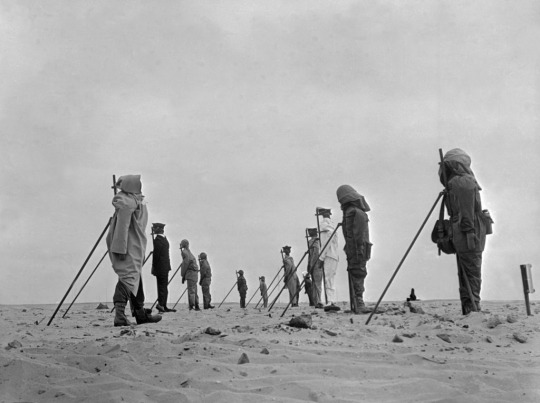
A group of dummies set up on the French nuclear weapons testing range near Reggane, Algeria, before Frances third atomic bomb test, 27th December 1960. © Keystone-France/Gamma-Keystone via Getty Images
One of the greatest crimes against humanity was the testing of nuclear and chemical weapons of mass destruction, which was carried out by France from 1960 to 1966 in the Sahara Desert in Algeria.
The first nuclear explosion happened on February 13, 1960, near the town of Zaouit Reggani in southwestern Algeria and was codenamed “Gerboise Bleue”. This experiment launched the process that turned Algeria into France’s nuclear test site. The power of the nuclear bomb was estimated at 60-70 kilotons, which is about four times greater than the bomb dropped by the US on Hiroshima during WWII.
A total of 17 nuclear tests were conducted in Algeria, which led to the death of 42,000 Algerians. Many people became disabled, and the negative impact on the environment and the health of local residents is felt to this day. Algerian authorities are demanding that France hand over maps which show where the radioactive waste from these experiments was disposed of. But to this day, France hasn’t complied.
France Is Still There
France suffered a severe blow when it lost its largest African colony, from which it derived great economic benefit. To this day, many problems between the two countries have not been fully resolved, and echoes of imperialism are still evident in their relations.
Algeria wants France to officially admit its guilt, and take responsibility for the past events. However, in the past 60 years, Paris has never offered an official apology to Algeria, although some of its leaders made certain apologetic statements. Moreover, Algerian leaders often raise the issue of approving a bill which would criminalize the colonial policy of Paris.
After gaining independence, Algeria faced contradictory emotions – it wanted to put an end to its former dependence on France, but the well-established trade ties, the lack of experienced national government officials, and the military presence stipulated by the Evian Accords ensured the presence of France in Algeria. Moreover, Paris provided the necessary financial assistance and supplied Algeria with essential goods.
Things changed when Algerian authorities decided to nationalize industrial and energy enterprises in the late 1960s. France’s intervention in the Western Sahara conflict, in which it supported Morocco, and a stop in purchases of Algerian oil, which led to a trade imbalance in the late 1970s, further strained relations between the two countries. However, despite a decline in political relations, economic ties with France– especially those related to the energy sector – have remained strong throughout the history of independent Algeria.
Four Key Issues
In December 2018, Algerian Minister of War Veterans Tayeb Zitouni stated that there are four key issues (the so-called “memory file”) related to the era of imperialism: the archive of documents from the colonial and Ottoman periods, the skulls of resistance fighters which are stored in the Paris Museum, the file of people who went missing during the war of independence, and compensation for the victims of nuclear tests. Zitouni said that addressing these issues is key to ensuring normal relations between France and Algeria.
In 2020, French President Emmanuel Macron agreed to hand over the remains of 24 Algerian resistance leaders who were killed and then beheaded by French colonial troops prior to the November 1954 revolution. All of them were buried at El Alia cemetery in Algiers. Negotiations continue on the return of other skulls, the number of which is not specified.
In late 2021, new tensions sprang up between France and Algeria. In his days as a presidential candidate, Emmanuel Macron recognized the colonization of Algeria as a crime against humanity. Macron said this on February 16, 2017, during a trip to Algeria. Nevertheless, by the end of his first presidential term, the countries were on the verge of a new diplomatic crisis – Macron still had not made an official apology for the “mistakes” of the past.
On October 3, 2021, Algeria decided to “immediately recall” its ambassador to France. The reaction was a response to an interview by Macron, published in Le Monde, in which he stated that since gaining independence in 1962, Algeria has lived off “income from history” which is diligently guarded by the military and political authorities, and questioned the existence of the Algerian nation prior to French colonialism. The former colony was insulted by these words.
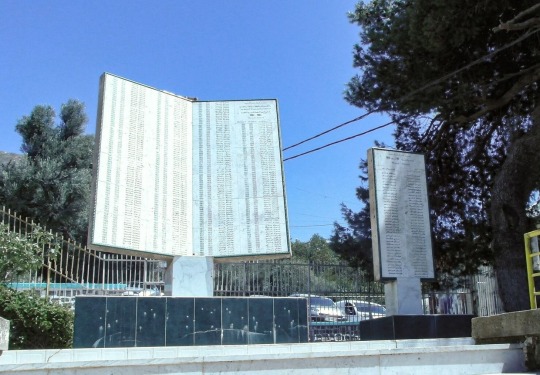
Monument in Kherrata. © Wikipedia
Soon, Algerian authorities took even stricter measures. The next day, Algeria banned French military planes from its airspace. This order is still in force. In 2023, the authorities declined France’s request to open Algerian airspace for French military aircraft heading to Niger, where a military coup had taken place – an event that seriously undermined France’s influence in the region.
In an attempt to improve relations with Algeria, Macron paid a visit to the country in August 2022 and signed a new partnership agreement with President Abdelmajid Tebboune, on cooperation in various fields. However, relations between the countries remain tense. Tebboune was supposed to respond with a similar visit on May 3, 2023, but it has been postponed. The reasons are the same – Algeria is still waiting for France to take action on a number of issues, which are all related to historical memory.
— By Tamara Ryzhenkova, Orientalist, Senior Lecturer at the Department of History of the Middle East, St. Petersburg State University, Expert for the Telegram Channel ‘Arab Africa’
#Feature#La Colonisation#France 🇫🇷#French History | Torture | Death | Indescribable Violence#The Evil Empire#France 🇫🇷 Colonial Crimes#Unresolved Crimes | Algeria 🇩🇿#RT#By Tamara Ryzhenkova | Orientalist | Senior Lecturer#Department of History | Middle East#St. Petersburg State University#Arab Africa#Continent of Africa | France 🇫🇷 | Nuclear ☢️ Weapons
1 note
·
View note
Text
Hello everyone, I wanna highlight this Sudanese family's campaign.
It is only 5k! and they're half way there but haven't gotten any new donations in 4 days! So please Donate & share, let's help this lovely family out 🫶
For more information and Sudanese fund campaigns to support, kindly check this list
Update:
As of Aug. 30th the goal has been extended to $7k. I would like to remind everyone that this campaign feeds 20 ppl and it has been up for 4 months now and the situation has only gotten worse in Sudan, what with the current destructive floodings and heavy rain.
I ask of you to please continue sharing and donating, while I will focus on other Sudanese campaigns 🙏 thank you all.
Sorry for the tags ♡
@magnus-rhymes-with-swagness @appsa @blackfilmmakers @decolonize-the-everything @lesbianmaxevans @parab0mb @goodguydotmp3
#sudan#sudan war#sudan crisis#africa#african politics#humanitarian aid#donate and share#free sudan#RSF#uae#united arab emirates#free palestine#السودان#حرب السودان#الامارات العربية المتحدة
2K notes
·
View notes
Text
There are currently 4 or more genocides going on right now not just the genocide of Palestine. Yemen🇾🇪, Congo🇨🇩, Sudan🇸🇩, Palestine🇵🇸, Armenia🇦🇲
#stop genocide#genocide#congo#yemen#sudan#free palestine#palestine#gaza#west bank#fuck the usa#africa#arab#arabic#armenia#ceasefire
5K notes
·
View notes
Text
Donate to help

#help with money#d0nations#gofundme#north africa#libya#arab#weather#weather news#storm#storm daniel#9/11#september 2023#crises#weather crises
1K notes
·
View notes
Text

Bedouin Women, Sinai Egypt
#Egyptian#Egypt#Sinai#مصر#مصرية#Arab#bedouine#Photography#women#africa#arabian#on the website i found it on said “sinai israel”#israelis tryna claim egyptian land too
153 notes
·
View notes
Note
Arabs are not native to North Africa, that's like saying white people are native to South America or South America. They're all there because of colonialism.
Except there’s tons of studies proving that the “Arabs” of North Africa are not descendants of Arabs but Arabized natives.
Very few Arab tribes settled in North Africa and the process of arabization was way more cultural than demographic. For example in a 2017 study that used Tunisia to represent North Africa they concluded that we were 88% North Africans/Imazighen, 2% from Western and Central Africa, 4% Arabs and 5% Europeans.
So Arabs as a whole are not native to North Africa but the people living there and calling themselves “Arabs” are native not colonizers.
You can totally condemn the arabization but claiming that Arabized natives are colonizers is stupid.
Lastly as I always say as an Algerian our grandparents fought for a FREE ALGERIA. For an ALGERIAN ALGERIA. They didn’t fight for an Arab Algeria or an Amazigh Algeria. So I don’t give a flying fuck if people are Arabized or not. We’re Algerians that’s it.
#ask#North Africa#arabization#same old discourse#it often comes from people who never opened a book and don’t know the difference between Arabs and people who have been Arabized.
432 notes
·
View notes
Text
Characters reconnecting with their ancestral cultures in an interplanetary setting
@pixiedustandpetrichor asked:
Hi! I am writing a novel with three main female characters in an interplanetary setting. They grow up as orphans in an Irish-coded country and as children are mostly exposed to solely that culture, but they leave after becoming adults.
Character A is Tuareg-coded, B Mongolian-coded, and C is Germanic-coded. It isn’t central to the story, but I would like them to get in touch with/learn more about their ancestral cultures, especially in terms of religion. A does this by actually visiting the planet her parents came from, but B and C do not.
What can I do to depict their relationships with said cultures and their journey to reconnect with them? Would it be realistic for each of them to have different mixed feelings about participating in these cultures and for them to retain some sense of belonging to the culture they grew up in as well? Thank you for your time.
Hello, asker! WWC doesn’t have Tuareg or Mongol mods at the moment, so we're not able to speak to the specifics of cultural and religious reconnection for these particular groups. Still, I want to take this opportunity to provide some general context and elements to consider when writing Tuareg-coded characters, or other characters from groups that have experienced colonization in the real world. My fellow mods will then share thoughts about cultural reconnection in general and with respect to Germanic heritage in particular.
Drawing inspiration from groups that have experienced colonization
As you’re probably aware, the Tuareg are an ethnic group indigenous to North Africa. As with many indigenous groups, they have experienced colonization multiple times over the course of their history. Colonization often leads to the loss or erasure of certain aspects of culture as the colonized people are pressured to conform to the culture of the dominant group. In many cases, it’s near impossible to say what the ancestral culture of a colonized group was prior to colonization.
When coding a fictional culture based on a group that was colonized in the real world, it's important to ask questions about:
Which aspects of culture you're portraying
Where these aspects come from
Whether you're ready to tackle their implications for the world you're building
It’s not necessarily wrong to use elements of coding that draw from cultural aspects influenced by colonization. As I said, it can be very difficult, even impossible, to portray a “pure” culture as it would have been had colonization not occurred��because we simply can’t know what that alternate history would look like, and because so much has been lost or intentionally suppressed that the gaps in our knowledge are too wide to breach. But it’s important to be aware of where these cultural elements are coming from.
Where is your coding coming from and what are the implications?
For example, while the Tuareg today are majoritarily Muslim, this was not the case prior to the Arab conquest of North Africa. Some elements of Tuareg culture today, such as tea ceremonies, are derived from the influence of Arab and Muslim culture and likely did not exist prior to the 20th century. As you’re developing the culture of the Tuareg-coded group in your fictional setting, you have to decide whether to include these elements. There is no right answer–it will depend on what you’re trying to do and why.
Is your setting in our far future, in which case we can assume your Tuareg-coded group is distantly related to today’s Tuareg?
In that case, they will probably have kept many cultural aspects their ancestors acquired through their interactions with other cultures around them–including cultural groups that colonized them. They may–let’s build hopeful worlds!–have reclaimed aspects of their ancestral culture they’d been forced to abandon due to colonization. They may also have acquired new aspects of culture over time. This can be very fun to explore if you have the time and space to do so.
I would recommend speaking with Tuareg people to get a better grasp of how they see their culture evolving over the next however many centuries or millennia, what they wish to see and what seems realistic to them.
Alternatively, maybe your setting is a secondary world unrelated to ours and you only want to draw inspiration from the real-world Tuareg, not represent them exactly. In that case, you need to decide which period of history you’re drawing from, as Tuareg culture is different today from what it was 50 years ago, and different still from 200 years ago or 1000 years ago. You’ll need to research the historical period you’re choosing in order to figure out what was happening at that time and what the cultural influences were. If it’s pre-colonial, you’ll probably want to avoid including cultural elements influenced by colonization from groups that arrived later on.
Finally, if the time period you’re drawing from is post-colonial:
Are you planning to account for the effects of colonization on Tuareg culture?
Will you have an in-world equivalent for the colonization that occurred in real life?
For example, will the Tuareg-coded characters in your world be from a nomadic culture that was forced to become sedentary over the years and lost much of their traditions due to colonial pressure to conform?
Where did this pressure come from in your world–is it different from what happened in ours? If so, how different? And what are the consequences?
Writing about colonization can be quite the baggage to bring into a fictional setting. I’m not saying it can’t be done, but it will certainly require sensitivity and care in portraying it.
In summary: think it through
I’m not saying all this to discourage you, but to point out some of the considerations at play when drawing inspiration from a real-life culture that has experienced colonization. Similar challenges arise for coding based on any other indigenous group in the world.
My advice to you, then, is to first sit down and decide where and when in history your coding is coming from, and what you’re trying to achieve with it. This will help you figure out:
which elements of contemporary Tuareg culture are pertinent to include
How much your coding will be influenced by the Tuareg’s real-life history
To what extent that will inform the rest of the world you’re creating
This, in turn, may help in deciding how to portray your character’s reconnection journey.
Again, I am not Tuareg and this is by no means meant to be an exhaustive list of considerations for writing Tuareg-coded characters, only a few places to start.
If any Tuareg or Amazigh readers would like to chime in with suggestions of their own, please do. As always, please make sure your comments adhere to the WWC code of conduct.
- Niki
Pulling from diaspora and TRA narratives of cultural reconnection
Marika here: This ask plotline could also pull directly from diaspora and TRA narratives of cultural reconnection. Many diaspora and TRA cultural reconnection stories are, in effect, about navigating the difficult process of resuscitating, or renewing ties to culture using limited resources in environments that often lack necessary cultural infrastructure or scaffolding.
See this question here to the Japanese team for suggestions of how to handle such a storyline in a similar sci-fi setting.
More reading: Japanese-coded girl from future
-Marika
Reconnecting with German heritage
Hi, it’s Shira. I’m not sure whether German-Jewish counts as Germanic for the purposes of your post but since German Jews were more assimilated than other Ashkies, Germanness does feel real and relevant to my life (especially because my father worked there for approximately the last decade of his life.) NOTE: when I see “Germanic” vs German I think of cultures from 1500 years ago, not 100-200 years ago, so I can’t help you there, but I’d be surprised as a reader if a character focused on that for reconnection to the exclusion of the 19th century etc.
People in the United States specifically, reconnecting with German heritage, often lean into Bayerischer/Bavarian kitsch, I’ve noticed. Personally, though, what I find most relevant is:
1. The food (although I’ve come to learn that what I grew up eating was closer to veal/chicken scallopini than actual schnitzel because it was drenched in lemon, but I do like the other foods like the potato salad and sweet and sour red cabbage etc.) Your character could try making one of these “ancestral” foods as a way to reconnect?
2. The classical music, because I’m a second generation professional musician – if character C plays an instrument, leaning into that might be meaningful (Beethoven, Bach, Brahms, Mendelssohn, Clara Schumann and her husband Robert, etc.)
3. The nature, especially specifics that I enjoyed during my time there – personally, I loved the bright pink flowers all over the chestnut trees, but there are a lot of choices especially because of the Alps. If C is an artist maybe they can sketch something Germany-related from old photographs they found on the Space Internet?
I think it is VERY realistic for the characters to remain connected to the culture in which they were raised, by the way, whether or not they have positive feelings about it. Culture isn’t an inherited trait. Sure, if they want to completely walk away, they can, but I bet there are still ways it will creep back in without them realizing it simply because it’s really hard to have universal knowledge of the origins of all our quirks. Plus, not everyone feels alienated from their raised-culture just because they’re genetically something else.
P.S. There is also Oktoberfest, which I don’t really get into but is a thing, and beer, which is another point of German cultural pride.
German gentiles, weigh in – y’all have your own stuff, I know! OH YEAH so for German Christians, Christmas “markets” are a whole thing. That’s worth looking up.
–S
What do you mean by Germanic?
Hello it’s Sci! I had to study German history for my historical fantasy novel set in the late 18th century Holy Roman Empire. I am not sure what is meant by Germanic as that can encompass a variety of things.
Germanic people: from the Classical Period of Roman Empire and early Middle Ages. Similar to Mod Shira, I unfortunately can’t help very much here.
The Germanosphere: regions that spoke German, which includes modern day Germany, Austria/Hungary, Switzerland, Lichtenstein, Belgium, and Luxembourg. I generally define this as the regions captured in the Hapsburg Empire along with Switzerland usually encompassing “Central Europe.”
Modern German national identity (i.e. German): post Napoleon and the Congress of Vienna (> 1815) only including the territory of modern day Germany.*
I ask this because modern German national identity is surprisingly recent since Germany only popped up in 1871 under Otto von Bismarck. Previously, Germany was divided into smaller states and city states as a very decentralized region under the German Confederation and before that, the Holy Roman Empire. Depending on the era, you can see different conflicts and divides. During the early days of the Protestant Reformation started by Martin Luther, the northern and southern German territories generally split along Protestant-Catholic lines. The 18th century saw Austria and Prussia as the foci of global power who warred against each other even though both were part of the Holy Roman Empire.
Other states and city-states like Baden-Wurttemberg or Saxony sometimes had power but it was typically more localized compared to Austria. Post-WW2, you saw the split of Germany into West Germany run under capitalism and East Germany run under communism as a satellite Soviet state leading to more modern cultural divides. Due to heavy decentralization historically, each region had its own character with religious and cultural divides.
Assuming that the Germanic character is not from the classical period or early Middle Ages but not from the 19th century either, you can include your character reconnecting to classical folklore like that of Krampus (if they’re Christian), German literature and music like the works of Johann Wolfgang von Goethe or Mozart, or German philosophy like Immanuel Kant.
*A major wrinkle: German royals and nobility married into other states and nations frequently with Britain and Russia being notable examples. In Britain, the House of Hanover took over after the Stuart House died without clear direct heirs. When Queen Victoria married the German prince Albert, they celebrated Christmas with a tree and brought the German tradition of a Christmas tree to Britain and the British Empire. Only during World War I did the royal family’s house of Hanover name change from House of Saxe-Coburg and Gotha to the more “English-sounding” Windsor. As a result, the German cultural influence may be even more widespread than we think.
However, without more specific descriptors of what Germanic means in the context of your story, it can be difficult to determine which aspects of German culture your character could reconnect to.
-Mod Sci
#culture#cultural disconnect#cultural reconnect#race coding#ethnic coding#German#Mongol#Tuareg#setting#science fiction#Jewish#Colonialism#History#North Africa#Arab#Muslim#history
351 notes
·
View notes
Text

Baggara Arab bride, Sudan, by Joanna B Pinneo
#baggara arab#arab#sudan#africa#north africa#folk clothing#traditional clothing#traditional fashion#cultural clothing
503 notes
·
View notes
Text
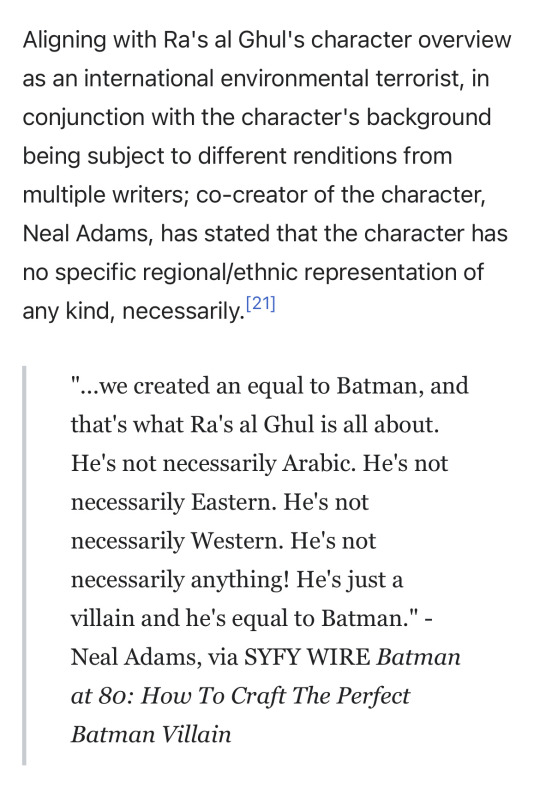
I fucking hate DC lol. His race is Villain
#they’re like R’as al Ghul is Chinese. he was originally one of a tribe of Chinese nomads (?) who settled in North Africa.#so we understand your confusion and why you might assume he’s of arab descent considering his name#and the fact that his base is in pseudo pakistan (???). but no he’s 100% chinese.#however.#as a sidenote.#he actually doesn’t have Any ethnicity!#he’s the only human whos ever existed who simply does not have a race or ethnicity.#i hope this clears it up.#also you’re weird and probably racist for wanting to know btw like why do you see color? ��#checkmate.
225 notes
·
View notes
Text

This is awful. Just flat out evil.
120 notes
·
View notes
Text

Arab women from North Africa
French vintage postcard, mailed in 1958
#africa#historic#briefkaart#postkaart#carte postale#ephemera#north#tarjeta#photo#postcard#women#postal#mailed#north africa#postkarte#ansichtskarte#arab#french#1958#sepia#photography#vintage
77 notes
·
View notes
Text

Two boys selling dates (fruit) - Tunis . 1930
#tunisia#north africa#africa#berber#tunisian#maghreb#amazigh#arab#photography#vintage#1930s#1930s vintage
244 notes
·
View notes
Text
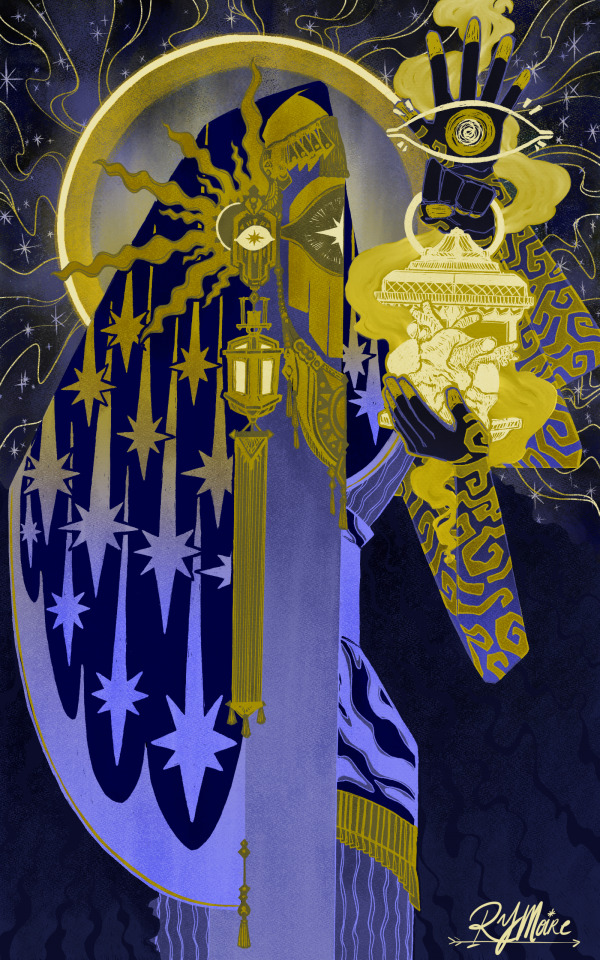
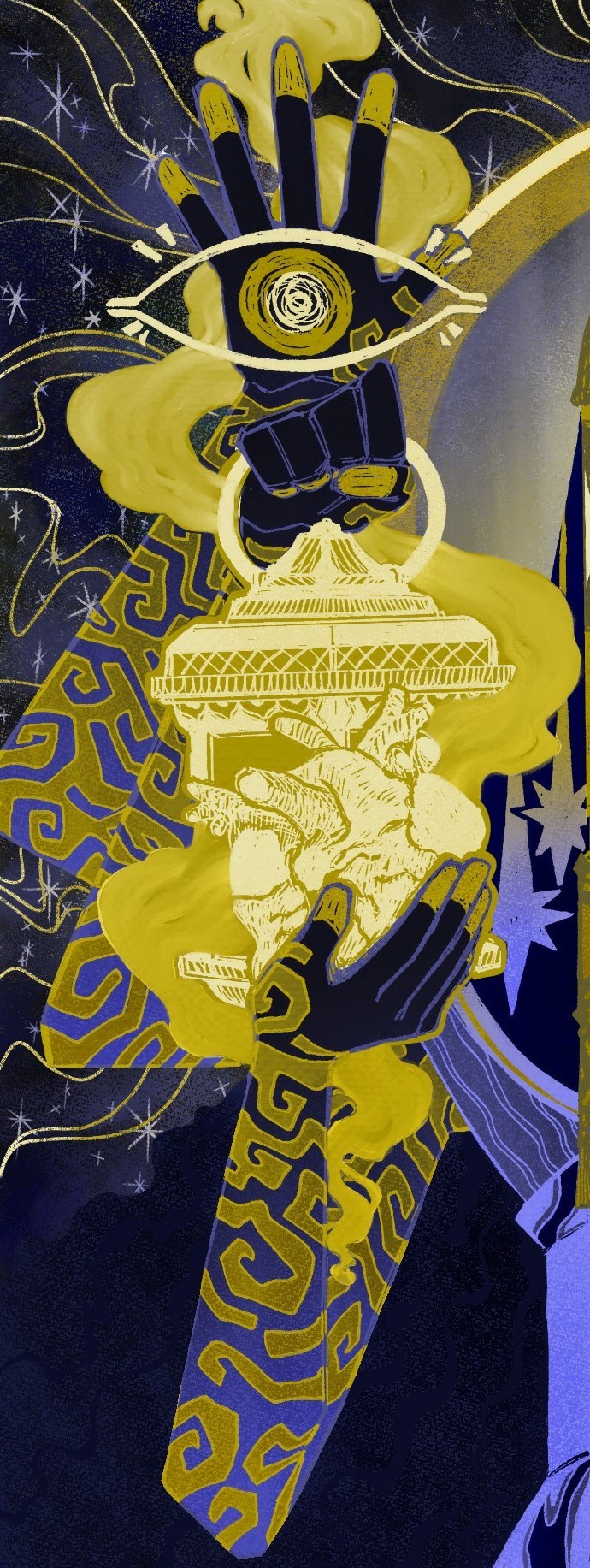
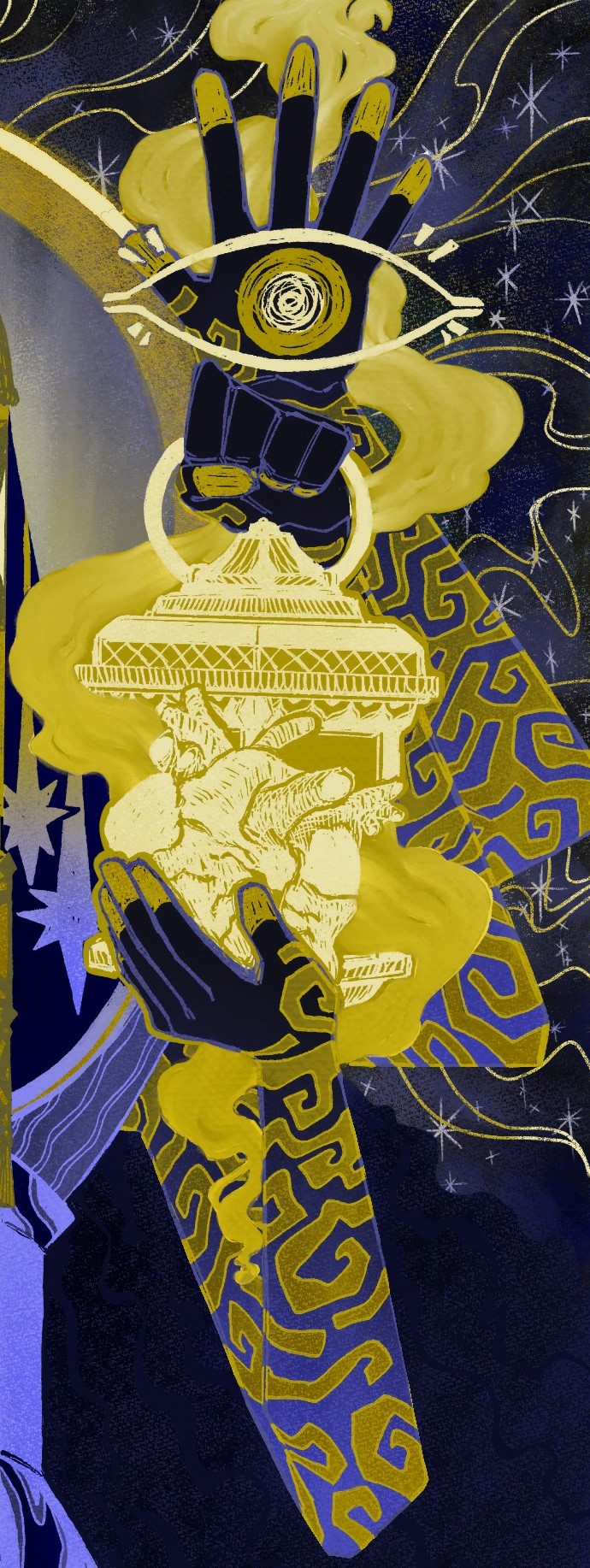
[ILLUSTRATION - MIRAGEVERSE]
"Um' Al Nuwr"
2023 was a year of growth and chaos for me.
Unfortunately, the chaos was quite hard to handle, therefore i needed any kind of break life could offer.
"No activity on social media" was my safe way (among others) and thankfully, I have quite the experience in being a ghost on the internet.
Hence, after some time i return in 2024 with renewed energy and a some late 2023 illustration !
******************************
Here is "Um' Al Nuwr" ("The Mother of Light" in Arabic), the original creator of the huge universe where most of my stories take place.
In her hands she carries the Three Pillars of her creation : the Mirageverse or, the universe of Mirages.
The Eye
The Lantern
The Heart
"The Lantern bears her Light, to illuminate even the darkest places with life.
The Eye keep watches on each of her Visions, to follow even the dangerously ambitious ones.
The Heart guards all parts of her Soul, to shield even those most heartless."
#my art#artists on tumblr#illustration#illustrator#my artwork#my original character#original art#comic artist#rymoire#original character#arabic#amazigh#moroccan#north africa#mirageverse#coming back for 2024#less chaos more productivity
100 notes
·
View notes
Photo

If 100 people lived in the Arab League, where would they live?
64 notes
·
View notes
Text
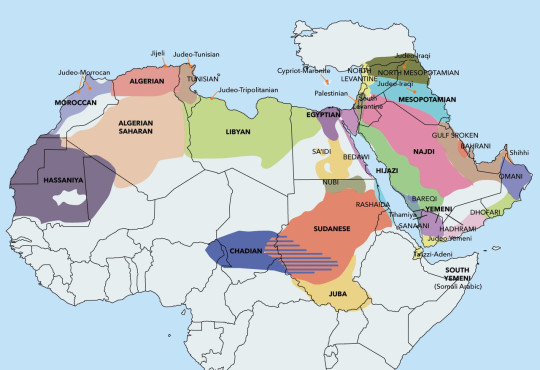
A map of Arabic dialects.
NizamNizamNizam:
FYI these are very different from one another. For example Hijazi to Egyptian would be like Texan english to Canadian, while Omani to Libyan would be like Jamaican Creole to Singlish.
(Source: industryarabic.com)
133 notes
·
View notes





